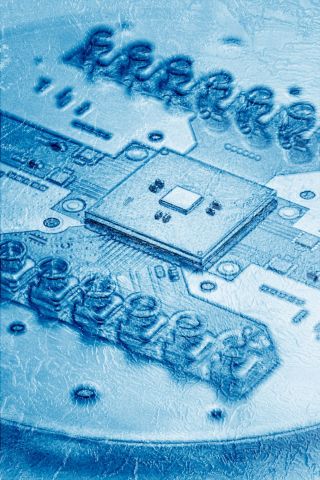Intel and QuTech Demonstrate Advances in Solving Quantum Interconnect Bottlenecks
Intel and QuTech have released significant findings in quantum research aimed at addressing the "interconnect bottleneck" between quantum chips and room-temperature electronics. This collaboration successfully validated Intel's Horse Ridge cryogenic controller chip, achieving 99.7% fidelity similar to room-temperature systems while controlling multiple qubits. By demonstrating frequency multiplexing, the research simplifies wiring for quantum computing, marking a key step towards scalability in the field. Future work may integrate the controller chip with qubits on the same die, enhancing quantum scalability.
- Demonstrated 99.7% fidelity in controlling qubits, matching room-temperature electronics.
- Successful frequency multiplexing allows control of two qubits with a single cable, enhancing system scalability.
- Research validates Horse Ridge as a scalable solution for quantum control electronics.
- None.
Insights
Analyzing...
What’s New: Today, Intel and QuTech – a collaboration between Delft University of Technology and the Netherlands Organisation for Applied Scientific Research – published key findings in quantum research to address the “interconnect bottleneck” that exists between quantum chips that sit in cryogenic dilution refrigerators and the complex room-temperature electronics that control the qubits. The innovations were covered in Nature, the industry-leading science journal of peer-reviewed research, and mark an important milestone in addressing one of the biggest challenges to quantum scalability with Intel’s cryogenic controller chip Horse Ridge.

A photo shows an Intel "Horse Ridge" chip mounted on a circuit board. Horse Ridge is a cryogenic control chip for qubits built using Intel’s 22nm FinFET Low Power technology. (Credit: Marieke de Lorijn)
“Our research results, driven in partnership with QuTech, quantitatively prove that our cryogenic controller, Horse Ridge, can achieve the same high-fidelity results as room-temperature electronics while controlling multiple silicon qubits. We also successfully demonstrated frequency multiplexing on two qubits using a single cable, which clears the way for simplifying the ‘wiring challenge’ in quantum computing. Together, these innovations pave the way for fully integrating quantum control chips with the quantum processor in the future, lifting a major roadblock in quantum scaling.”
--Stefano Pellerano, principal engineer at Intel Labs
Why It Matters: A key bottleneck for quantum computing lies between the quantum chip stored in low, cryogenic temperatures in dilution refrigerator and room-temperature control electronics that control the qubits. Getting the control electronics to operate at high fidelity at cryogenic temperatures is key to overcoming what is referred to as the “interconnect or wiring bottleneck.” Intel took the first step to address this challenge when it introduced Horse Ridge, a cryogenic control chip for qubits built using Intel’s 22nm FinFET Low Power technology. A second generation of the chip was introduced last year. Horse Ridge brings key control functions for quantum computer operation into the cryogenic refrigerator – as close as possible to the qubits themselves – to streamline the complexity of control wiring for quantum systems.
This latest research successfully demonstrates results from randomized benchmarking that show a commercial CMOS-based cryo-controller achieving coherent control of a two-qubit processor at the same levels of fidelity (
More About the Research: Intel and QuTech successfully demonstrated frequency multiplexing by using the same cable to control two qubits. This is an important proof of concept because today each qubit is individually controlled by its own cable – an approach that is not scalable as qubit counts increase. Horse Ridge aims to solve that limitation by leveraging multiplexing to reduce the number of radio frequency cables needed for qubit control.
The research team demonstrated the programmability of the controller by running a two-qubit algorithm called the Deutsch–Jozsa algorithm, which is more efficient on a quantum computer than on a traditional computer.
The research results, verified by randomized benchmarking, validate the original promise of Horse Ridge as a highly integrated and scalable solution for simplifying quantum control electronics, and prove that the technology can be directly applied to multi-qubit algorithms and noisy intermediate-scale quantum devices.
What’s Next: With continuing research in this field, it may be possible to fully integrate the controller chip and the qubits on the same die – they are all fabricated in silicon – or package, paving the path for quantum scalability.
More Context: Quantum Computing at Intel (Press Kit) | Intel Labs (Press Kit)
About Intel
Intel (Nasdaq: INTC) is an industry leader, creating world-changing technology that enables global progress and enriches lives. Inspired by Moore’s Law, we continuously work to advance the design and manufacturing of semiconductors to help address our customers’ greatest challenges. By embedding intelligence in the cloud, network, edge and every kind of computing device, we unleash the potential of data to transform business and society for the better. To learn more about Intel’s innovations, go to newsroom.intel.com and intel.com.
© Intel Corporation. Intel, the Intel logo and other Intel marks are trademarks of Intel Corporation or its subsidiaries. Other names and brands may be claimed as the property of others.
View source version on businesswire.com: https://www.businesswire.com/news/home/20210512005757/en/







